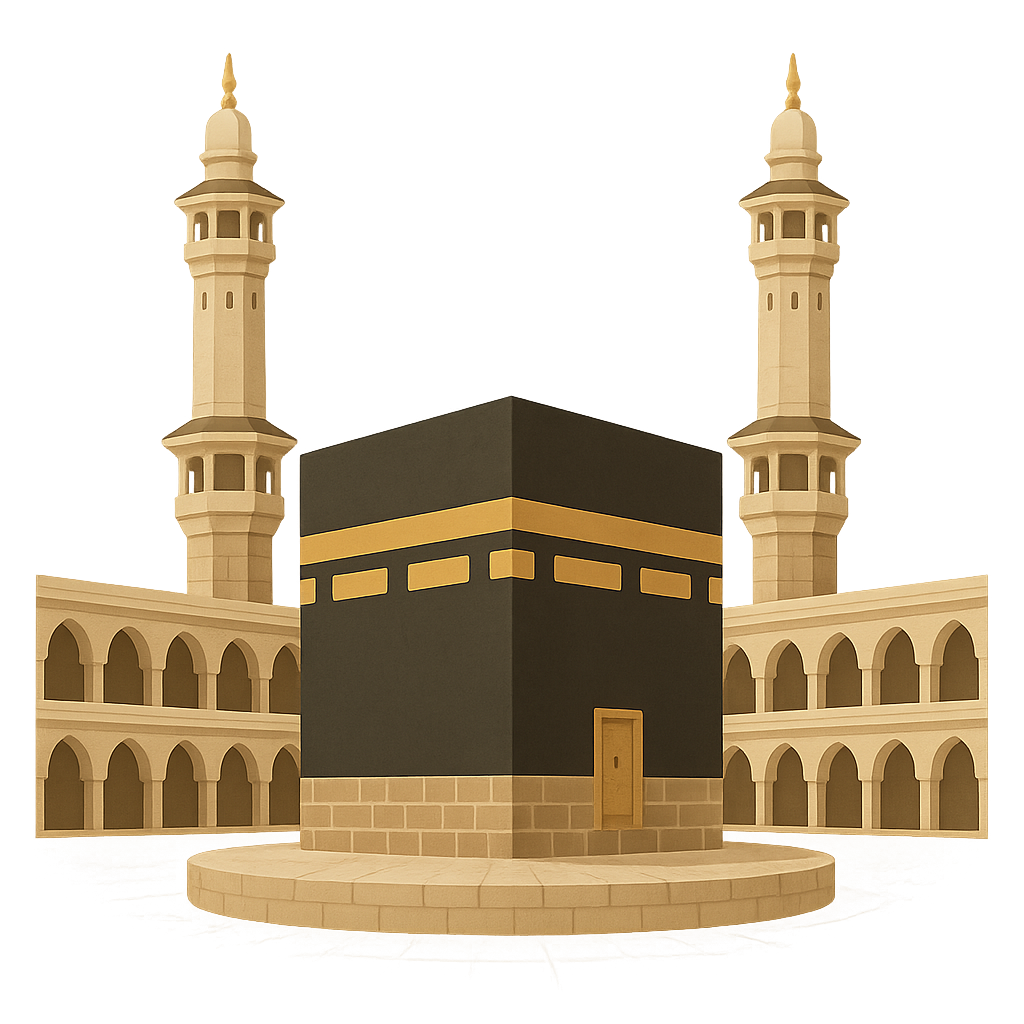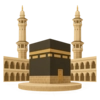The City of a Million Voices
The sun beats down on the rocky mountains that cradle me, a heat that has baked my sands for thousands of years. From my heart, a sound rises, a gentle and constant murmur that grows into a powerful chorus. It is the sound of millions of voices, speaking dozens of languages, yet all whispering the same prayers. I see them move as one, a vast, flowing river of people dressed in simple, seamless white cloths. They circle a perfect, black cube draped in silk and gold, their steps a timeless rhythm of devotion. For centuries, I have been a destination, a point on the map that pulls at the souls of people from every corner of the earth. I am a valley of peace, a sanctuary of faith. I am Mecca.
My story begins in an age of sand and stars, long before my streets were paved or my skyline rose. It began with a prophet named Abraham, known as Ibrahim, who journeyed to my barren valley under God's command. With him were his wife, Hagar, and their infant son, Ishmael, or Isma'il. When their water was gone, a desperate Hagar ran between the two small hills of Safa and Marwa, searching for help. In that moment of pure faith, a miracle occurred. A spring of fresh water bubbled up from the sand at Ishmael’s feet. This was the Well of Zamzam, and it gave my dry valley life. Years later, in the year 2130 BCE, Abraham and a grown Ishmael returned to that very spot. Together, they raised the foundations of a simple, cube-shaped building—the Kaaba. It was not a home for a king or a palace of gold, but a house dedicated to the worship of the one true God, a beacon for all humanity.
Thanks to the life-giving waters of Zamzam, a community grew around the Kaaba, and I became more than just a place of pilgrimage. I blossomed into a bustling crossroads of commerce. Great caravans of camels, their bells jingling in the desert air, traveled hundreds of miles to reach my gates. They carried fragrant spices from India, shimmering silks from China, and precious incense from Yemen. My markets were filled with merchants exchanging goods, stories, and ideas from faraway lands. I was a vibrant hub of culture and trade. But as centuries passed, the memory of Abraham's message began to fade. The Kaaba, which he had built for the worship of one God, was slowly filled with idols. By the 6th century CE, over 360 statues made of stone and wood crowded its sacred space, each representing a different tribe or deity. The pure purpose of my heart had become clouded and forgotten.
Then, in the year 570 CE, a child was born within my walls who would change my destiny and the course of history forever. His name was Muhammad. He grew into a man known for his exceptional honesty and wisdom. Troubled by the state of his society, he often retreated to a cave in the mountains overlooking my city to pray and reflect. It was there, around the year 610 CE, that he received his first revelation from God. He was called to be a prophet, to remind people of the one God of Abraham and to call them away from idol worship. His message was simple but revolutionary, and it was met with fierce resistance from the powerful leaders who profited from the pilgrimages to the idols. For years, he and his small group of followers faced hardship. In 622 CE, they undertook a migration, the Hijra, leaving me for the city of Medina to build a safe community. But my story with him was not over. In 630 CE, the Prophet Muhammad returned to me, not with an army of conquest, but with thousands of followers in peace. He entered my sacred sanctuary, circled the Kaaba seven times, and then, one by one, he gently removed the idols, declaring, "Truth has come, and falsehood has vanished." With that act, he cleansed my heart and restored the Kaaba to its original, sacred purpose as a house for the one God.
Today, that legacy of unity lives on in a powerful, beautiful way. Every year, millions of people journey to me for the annual pilgrimage called the Hajj, following in the footsteps of prophets. When they arrive, they leave behind their fine clothes, their jobs, and their titles. They all dress in the same simple white garments, called the ihram. In these white cloths, a king looks no different from a farmer, a wealthy merchant no different from a humble worker. They stand shoulder to shoulder, a breathtaking symbol of equality before God. You can hear them chanting in unison, "Labbayk Allahumma Labbayk," meaning, "Here I am, O God, at Your service." They move together in a great, circling tide around the Kaaba, a constant, living river of humanity. I am no longer just a city of stone and sand. I am a global symbol of connection, a place where people from every nation, race, and language come together as one family. My story is a timeless reminder that in faith and shared humanity, we are all equal, all connected, and all part of a single, beautiful circle.
Reading Comprehension Questions
Click to see answer



